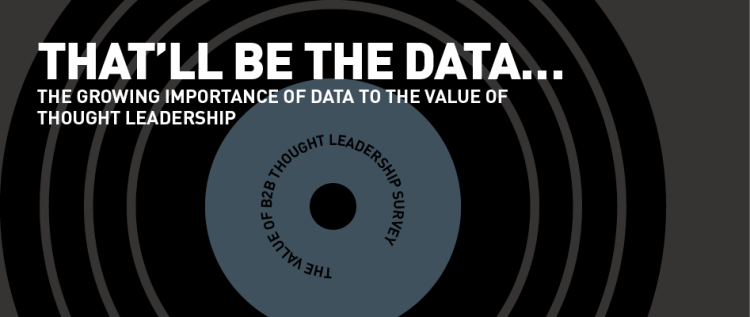The importance of thought leadership for B2B marketing has been confirmed by Grist’s Value of B2B thought leadership survey. It found 99% of senior executives at enterprise firms believe that it is either important or critical in assessing the suitability of a new adviser. But what is it about thought leadership that the C-suite values most?
The survey of 525 senior executives at enterprise firms in the US, Europe and Asia found an increased demand for robust data. Business leaders still value fresh thinking in their thought leadership (as found in 2016), but it needs to be backed up by reliable data – robust data is the most sought-after quality in thought leadership (44%), up from 29% in 2016.
Why such a big jump in the importance of data? The answer is simple. While the landscape is vast, it’s becoming increasingly crowded. The world is now littered with content masquerading as thought leadership. This content includes flimsy insights or commercially driven copy, which has made today’s audience wary of what to trust.
 Highlighting robust data as the key driver behind thought leadership will help you stand out and get attention. Add in an analysis of industry trends, feature case studies from your target audience, and include informed opinion from your company’s experts, and your thought leadership becomes incredibly valuable to those you’re trying to influence.
Highlighting robust data as the key driver behind thought leadership will help you stand out and get attention. Add in an analysis of industry trends, feature case studies from your target audience, and include informed opinion from your company’s experts, and your thought leadership becomes incredibly valuable to those you’re trying to influence.
Trying to drive readers away? Then by all means dive into unsubstantiated opinions (58%), fail to show original insight or ideas (45%), be generic (39%) or get too conceptual (43%).

It may be a favourite mantra of Donald Trump, but ‘fake news’ has had a serious impact on thought leadership. That sense of mistrust and anxiety around the information we consume has crept into our business lives.
58% of our respondents cited unsubstantiated opinions as the biggest turn-off when it comes to thought leadership. Home in specifically on the US, and that figure rises to 66%, another example of the Trump-effect perhaps.
Brexit, along with Trump has also played its part in feelings of mistrust. Prior to the EU referendum in 2016, unsubstantiated opinions was fifth in the list of turn-offs. It’s now top. It’s another reminder that people are demanding that opinions are backed up with data.
Business leaders want originality with recommendations. If you fail to provide fresh insights and instead promote yourself in the content (42%), you’ll lose the lead. It’s also worth noting the look and feel of the thought leadership is more important than you think. Bad design (41%) and poor writing (32%) round up the turn-offs highlighted in our survey.
For even more insights on the thought leadership preferences of the C-suite, download the Value of B2B thought leadership survey: How the C-suite view and use thought leadership.
You can view all the material on our Knowledge Centre, free of charge. Simply register for Online Membership of The Financial Services Forum for full access.

